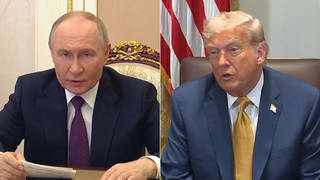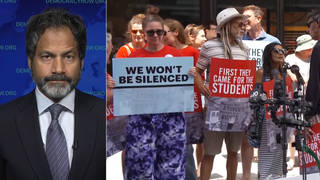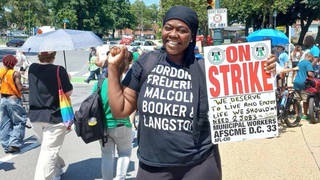
Topics
Guests
- Nir Rosenindependent journalist who has covered the Iraq war since 2003. He is a fellow at the NYU Center on Law and Security. He just returned from a trip to Iraq with Refugees International.
At least fourteen people have been killed and nearly sixty wounded in a string of attacks in Baghdad on the first day of voting in Iraq’s parliamentary elections. Iraq opened its polls on Thursday for early voting, including for hundreds of thousands of soldiers, police officers and prisoners. We speak to Nir Rosen, an independent journalist who has covered the Iraq war since 2003. [includes rush transcript]
Transcript
JUAN GONZALEZ: At least fourteen people have been killed and nearly sixty wounded in a string of attacks in Baghdad on the first day of voting in Iraq’s parliamentary elections. Iraq opened its polls on Thursday for early voting, including for hundreds of thousands of soldiers, police officers and prisoners. Suicide bombers attacked two different polling stations in different areas of the city, and a mortar attack was fired on a crowded market. Thursday’s violence came a day after a large coordinated wave of attacks killed at least thirty-one people in Baquba.
The majority of the country goes to the polls on Sunday. Strict security measures are being enforced, including restricting travel around the country and banning all civilian vehicles on election day. More than 6,000 candidates are competing for 325 seats in the election. The alliance led by current Prime Minister Nouri al-Maliki is being challenged by a number of groups, including a coalition that includes Shia cleric Muqtada al-Sadr and an alliance led by the former prime minister Iyad Allawi.
AMY GOODMAN: Meanwhile, voting begins today among Iraqi expatriates in Jordan, Syria and fourteen other countries. The United Nations refugee agency estimates more than 4.2 million Iraqis have fled the country since the 2003 invasion.
Iraqis are voting for a new four-year government that will be in place as the US is scheduled to complete the withdrawal of its remaining troops by the end of 2011.
Nir Rosen is an independent journalist who has covered the Iraq war since 2003. He’s a fellow at the NYU Center on Law and Security. He’s just returned from a trip to Iraq with Refugees International. He was also in Afghanistan.
Welcome to Democracy Now!
NIR ROSEN: Thanks for having me.
AMY GOODMAN: So talk about this latest string of attacks leading up to these elections.
NIR ROSEN: Well, we’ve seen that there’s been a consistent occurrence of once monthly or twice monthly spectacular terrorist attacks in Iraq. So I think it’s important not to give them too much significance. They’re terrible. They’re criminal. Iraqis don’t deserve to be suffering like this. But in terms of strategic impact on Iraq, I think it’s negligible, especially when you think about what Iraq has been through.
I don’t think it affects the stability. And certainly, we’ve seen in the past, before sort of big events like this, there are terrible terrorist attacks, presumably by al-Qaeda, although it’s even possible that some of Maliki’s rivals are doing this to undermine his claim to have reduced violence in Iraq. But violence is so significantly down, civilian deaths are so significantly down, that these occasional attacks are more the exception than the rule.
We have daily incidents of assassinations. It’s sort of targeted assassinations with silenced pistols, with magnetic car bombs, so-called sticky bombs, targeting politicians, clerics, security officers. But none of these things can actually affect the big picture in Iraq. And I think it’s important to stress that. And I almost feel like I’m — I sound like a neocon. But Iraq, in a way, is quite stable these days.
There’s nobody that can undermine — that can overthrow the system. They can kill innocent civilians, and they do that. They can assassinate security officers, politicians, and they do that. But unless they could kill Maliki, which I think is difficult, there isn’t really much you can do to undermine the larger system. There’s no insurgent group, there’s no militia, that has the power to even engage the security forces in a battle, which in the past they could do, running battles with large groups of insurgents or militiamen attacking checkpoints and other government offices. These days all they have are car bombs and suicide bombers.
So, as terrible as it is and as much as the Iraqis are still suffering, suffering because of the American occupation — well, that’s coming to an end — it’s important to stress that, in a way, it’s not a big deal sort of strategically.
JUAN GONZALEZ: But in your writings in this last trip, you remark about how the level of stability, compared to previous trips that you’ve been on, in terms of everyday life, especially once you get out of the Green Zone and the battles between the various elites — what life is like for the everyday Iraqis.
NIR ROSEN: I think too much attention is given, in fact, to the political squabbling in the Green Zone, in the IZ, as it’s called now, and it’s always been the case, from 2003. The media and the American government and military have focused too much on the Iraqi elite in the IZ, English-speaking politicians, their squabbles, which are inevitably more sectarian and more bitter than what might exist on the street. So they ignored the growing resistance to the occupation, because they weren’t paying attention to the street. They ignored the civil war and the first signs in 2004, because they weren’t paying attention to the street.
Likewise, in the last couple of years, in part because attention has drifted to Afghanistan, people have ignored the fact that the security vacuum which has existed in the past is no longer really there. The need for the militias to defend Shia civilians or defend Sunni civilians or fight the American occupation is no longer there. The fear of extermination, which was so palpable in the past among the Iraqi civilians, extermination by Sunnis or by Shias or by Wahhabis, depending on who you are, that’s no longer there.
The Iraqi security forces, there are several changes. In the past, in the early days, they used to be cowering, masks on their faces, really just terrified, like sheep. Then they became very aggressive. They were acting as death squads, sectarian militias. That, too, is over. These days their presence is pervasive. It doesn’t matter how remote the village you go to is, it seems as if there are police or army there. And they are no longer acting as sectarian death squads. They take themselves very seriously, as though “we are the state.” A little bit too seriously. There are dangerous authoritarian tendencies there. But at least we’re not seeing the security forces acting as sectarian militias targeting civilians at random. There are gross human rights abuses — detention without trial, things like that, torture in prison —- but it’s not for sectarian reasons. So Iraqi civilians these days feel much safer.
What I do think is being ignored is the grave humanitarian crisis in which many Iraqis have to endure. And I think that’s a terrible shame. That’s, again, in part -—
JUAN GONZALEZ: Well, you still have several million displaced people or refugees.
NIR ROSEN: We have, we believe, about a million and a half internally displaced Iraqis. Half-a-million of those are homeless, meaning they’re living in squatter camps, in tents and makeshift homes made of mud and tin cans on huge sewage pits and garbage pits. And their kids are running around, playing in sewage and garbage. You can’t breathe when you go there, the stench is so terrible. Very little access to water, to power, to medical care, to the state, because they’re squatters. They’re just inhabiting abandoned military bases, abandoned garbage lots.
And I think as the American government shifts its focus to its war in Afghanistan, it’s important to remember the huge obligation we have to the Iraqi people. We started this war. We created this humanitarian crisis. Our obligation goes back to sanction era, when we impoverished the country. But certainly, the displacement is a direct result of the American occupation and the structures we created and our neglect. And as we move on to Afghanistan, we have to remember that we have an obligation to the Iraqi people, not only to maintain — to make sure that the government is not a human rights abuser — and there is that tendency, sort of a Shia Saddam state — but to maintain our levels of humanitarian assistance, especially as we see that the UN is too pusillanimous to actually go out and interact with the people.
The UN was traumatized in 2003 by the Canal bombing, Canal Hotel bombing, so they have no access to the people. They’re stuck in the IZ. The US military, which was engaged in some kind of a humanitarian assistance, whether that’s wrong or right, is now basically withdrawn from much of Iraq. The Iraqi government is still incapable of really providing services to the people. The European countries, European donor countries, just don’t really want to be involved. They’re following the American lead. In fact, European countries would like to say that the humanitarian crisis in Iraq is over, so that they can send the Iraqi refugees back and turn down more Iraqis, because who wants more Arab Muslims coming into their countries in Europe these days?
So I think it’s important to stress that we should ignore these political squabbles — they’re, in some sense, a sign of at least some maturity — but focus on the humanitarian crisis, which can actually, in the future, also lead to security problems. Unemployment is terrible. Lack of access to education. I think only 30 percent of Iraqi children proceed from primary to secondary education. And when you visit these places, you see they’re getting no assistance from anybody. And they rely for their existence on the Iraqi ration system, the public distribution system, which has been very damaged and is lacking in many of its supplies.
AMY GOODMAN: The Washington Times reports, Nir Rosen, in 2010 President Obama mentioned the Iraq war just three times during formal speeches, twice in one sentence in back-to-back events in early February for the Democratic National Committee and once in his State of the Union address.
NIR ROSEN: There’s been a tendency lately on the part of the right wing to take this point of view, that the Obama administration is neglecting Iraq. I think they are certainly engaged financially. I’m glad that they’re disengaging militarily, and most Iraqis are glad about that. And there’s hopefully a transition towards a normal diplomatic relationship eventually. I think it’s possible that some of that concern about neglect is also because the media is — we’re neglecting Iraq, in a way. For me as a journalist, it’s hard to find anybody interested in sending me to Iraq. Eyes are shifting towards Afghanistan.
AMY GOODMAN: What about administration officials floating this idea that with the increased violence, that US troops would not be leaving by the end of the year?
NIR ROSEN: Certainly General Odierno, I think, has taken that position. And some right-wing thinkers like Fred Kagan are urging that we increase our troop presence, or basically break our agreement with the Iraqi government. That would be a terrible thing. Iraqis want the military presence to end.
AMY GOODMAN: The deadline’s September.
NIR ROSEN: The Iraqi government takes its sovereignty very seriously. I think they want a long-term strategic relationship with the Americans. And in a way, this is a neocon dream, have a moderate strategic ally in the region that could counterbalance Saudi Arabia and Iran. I hate to admit that there is that — they may be able to claim that in a few years. And it will be at the expense of millions of displaced and hundreds of thousands of dead and a pretty authoritarian regime.
But their fear is also Iran. They say that Iran is taking over Iraq, but there’s just no evidence of that. The Iraqi government, its leadership now, Maliki, and others, take their nationalism and their sovereignty very seriously. Iran has influence, as do many other countries in the region. The Saudis have influence. The Turks have influence. But I believe Iraq is a strong, independent and sovereign nation. There’s this racist idea that Shia Arabs are somehow behooven pawns of Iran, and that’s just false. This is perhaps the Saudi influence on American policy.
JUAN GONZALEZ: You know, only in the United States would someone say that keeping 50,000 troops in a country is ending an occupation. What is your sense of how long US troops are going to be in Iraq, even after the deadline for removing the, quote, “combat troops”?
NIR ROSEN: I think they’ll be there for decades to come in some sort of long-term agreement with the Iraqi government, presumably — I believe Maliki is going to win the elections. And there will be a couple of months of difficulty working out the nature of the government, but I still believe he’s the most popular candidate. And I believe that his people want a long-term military relationship, in terms of training, training of the air force and the navy, the security forces. Regardless of whether that’s right or wrong, this appears to be what’s going to happen.
There is a slightly positive role the Americans are playing right now in northern Iraq, where it seems as if, if the Americans were not acting as a buffer between the Arabs and Kurds in Ninawa, in Kirkuk, in Diyala, that we would have seen military clashes at this point. As Maliki and some of his allies and an Arab nationalist governor of Ninawa sort of flex their muscles and flex their sovereignty, the Kurds are feeling more and more nervous, as if their star is fading. They had their moment when it looked like they had a lot more influence, and now it seems like they’re — to them, perhaps, they feel more vulnerable, they’re being abandoned. And we’ve seen near clashes, both sides playing this game of brinksmanship. And the Americans are there with — UN is also quite concerned that this could be a spark to greater conflict.
But in terms of American presence in the rest of the country, it just isn’t necessary. The Iraqi security forces really are quite capable, very well trained. They have some difficulty, I think, maintaining their border forces these days still. As I said, they do need some improvement in their air force. But I think we can envision a day when they’re so aggressive that they might consider going after the nineteenth province again, which is Kuwait. I mean, the Iraqi nationalism is quite strong there. Maliki’s clique in the government takes the notion that they’re a democracy, the only democracy in the region, quite seriously, and they look down upon other countries in the region.
But the days of the American occupation are basically over. The Iraqis don’t want it. The American military no longer has the same authority it had in the past. They’re still there. They’re still killing innocent civilians, although the Iraqi government is, as well. But it’s true, you can’t maintain thousands of troops in a country without that having some palpable effect on the people. We can envision, in the future, it will be something like Germany or Korea, but I think it’ll take a long time to get there.
AMY GOODMAN: Nir Rosen, I want to thank you very much for being with us, independent journalist who’s covered the war in Iraq since 2003, now a fellow at the NYU Center on Law and Security.













Media Options